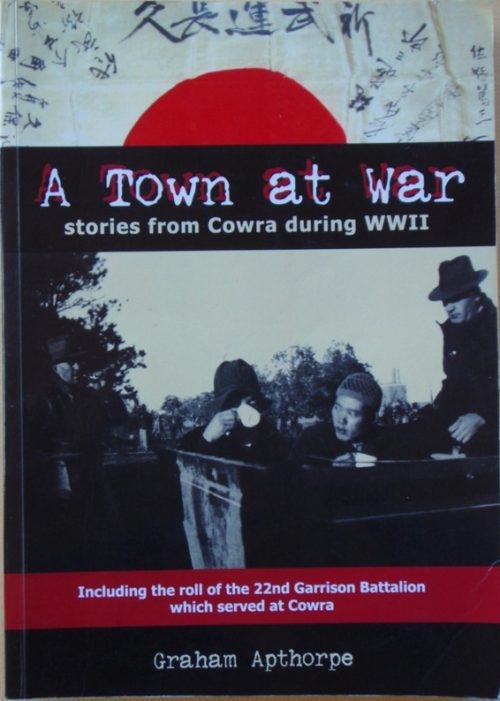Description
Title: A Town at War – Stories From Cowra during WWII. Including the roll of the 22nd Garrison Battalion which served at Cowra
Author: Apthorpe, Graham
Condition: Very Good
Edition: 1st Edition
Publication Date: 2008
ISBN: 9781864770627
Cover: Soft Cover without Dust Jacket – 290 pages
Comments: The stories from the town of Cowra during World War II including detailed information about the Cowra Escape and the 22nd Australian Garrison Battalion. One of the best accounts of the escape.
During World War II, a prisoner of war (POW) camp near the town of Cowra in New South Wales, Australia was the site of one of the largest prison escapes of the war, on 5 August 1944. At least 545 Japanese POWs were involved in the breakout.
By August 1944, there were 2,223 Japanese POWs in Australia, including 544 merchant seamen. There were also 14,720 Italian prisoners, who had been captured mostly in the North African Campaign, and 1,585 Germans, mostly naval or merchant seamen.
Although the POWs were treated in accordance with the Geneva Conventions, relations between the Japanese POWs and the guards were poor, due largely to significant cultural differences: Japanese culture at the time regarded capture and detention as shameful and expected soldiers to die rather than accept capture.
A riot by Japanese POWs at Featherston prisoner of war camp in New Zealand, in February 1943, led to security being tightened at Cowra. Eventually several Vickers and Lewis machine guns were installed to augment the rifles carried by the members of the Australian Militia’s 22nd Garrison Battalion, which was composed mostly of old or disabled veterans or young men considered physically unfit for frontline service.
Within minutes of the start of the breakout attempt Privates Benjamin Gower Hardy and Ralph Jones (GC) manned the No. 2 Vickers machine-gun and were firing into the first wave of escapees, but they were soon overwhelmed by the sheer weight of numbers and killed. However, Private Jones managed to remove and hide the gun’s bolt before he died. This rendered the gun useless, thereby preventing the prisoners from turning it against the guards.
Hardy and Jones were posthumously awarded the George Cross as a result of their actions.
No. 12 Camp continued to operate until the last Japanese and Italian prisoners were repatriated in 1947.




